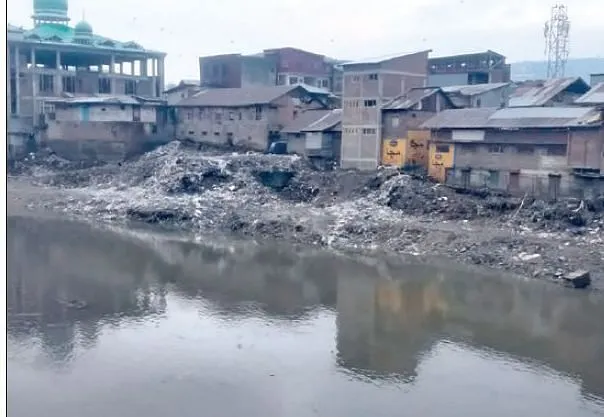Baramulla: Once a lifeline of people of Baramulla district, the River Jhelum in Baramulla is fast turning into a cesspool.
The reckless use of riverbanks as unauthorised garbage dumping sites has deteriorated its water quality.
The deteriorating condition of the River Jhelum at Baramulla is mainly attributed to the dumping of tonnes of garbage on its banks or close to it, polluting the river beyond repair.
Besides, scores of syringes and other medical wastes can be spotted scattered around the banks of the river, making the river water further polluted.
Among the dumping waste include polythene bags and plastic bottles which have been the main source of waste, considered extremely dangerous for the environment.
“The other biggest source of pollution in River Jhelum besides garbage dumping is poultry and animal excreta which further pollute it,” said Farooq Ahmad, an environmentalist.
The river is also the main source of providing drinking water to over 90,000 people of the town. As per officials of the Jal Shakti Department, on average over 6 million gallons of drinking water is supplied to the town residents from the river every day.
However, with no solution to the deteriorating condition of the river, the drinking water quality is worsening with each passing day.
“The authorities should take all measures to protect it from pollution as the freshwater biodiversity is in crisis,” said Mushtaq Ahmad, a local.
Although Municipal Council Baramulla has started garbage collecting services from different town wards, the biggest issue for the municipal council is to dump the waste material at the designated dumping site.
In the absence of the dumping site, the garbage waste is often dumped at different unauthorised sites.
The River Jhelum has had a significant role in determining the socio-economic status of the people of Baramulla town.
The river in the past was the main mode of goods transportation from one place to another.
The local economy was by and large connected with the River Jhelum and had been part and parcel of people’s growth.
The locals here said that concrete measures from the Baramulla district administration could save the river from further deterioration.
They said that despite a growing population, the administration had been unable to set up a solid waste mechanism with the result tones of garbage were being dumped on the riverbanks or at those places which had the potential to cause an extreme level of pollution.
“Identification of garbage dumps can relieve the town from unauthorised waste dumping. Besides, a proper solid waste management mechanism, especially in urban areas like Baramulla town will ensure better health for River Jhelum,” said Muhammad Ashfaq of Baramulla town.






